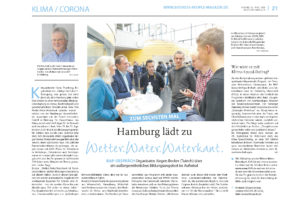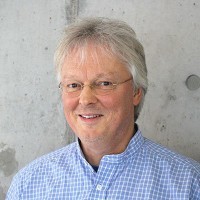Wetter.Wasser.Waterkant.2020
Tutech staff member Jürgen Becker speaks to B&P about an unusual education programme that’s on the up.
Hamburg’s free education week for schools on climate, sustainability and social change Text: Wolfgang Becker, B&P Climate activist Greta Thunberg, founder of the “Fridays for Future” movement, was just ten years old when students from Hamburg schools were invited for the first time to a wide-ranging educational event on climate, sustainability and social change entitled Wetter.Water.Waterkant. Initiated by the Hamburg environment ministry and organised by Tutech Innovation GmbH in Harburg, it had one main topic: the climate itself and consequences for the environment and urban life. The educational programme for schools will be taking place for the sixth time from 21 to 25 September 2020. For a year now, organiser Jürgen Becker, network manager for climate at Tutech, has been aware of a noticeable hype: the number of partner companies has risen, the almost 6,000 places offered for participants in workshops, excursions and lectures were almost completely booked out last year and the programme is now 110 pages long. There is no doubt about it, the climate has definitely become a hot topic.
Climate activist Greta Thunberg, founder of the “Fridays for Future” movement, was just ten years old when students from Hamburg schools were invited for the first time to a wide-ranging educational event on climate, sustainability and social change entitled Wetter.Water.Waterkant. Initiated by the Hamburg environment ministry and organised by Tutech Innovation GmbH in Harburg, it had one main topic: the climate itself and consequences for the environment and urban life. The educational programme for schools will be taking place for the sixth time from 21 to 25 September 2020. For a year now, organiser Jürgen Becker, network manager for climate at Tutech, has been aware of a noticeable hype: the number of partner companies has risen, the almost 6,000 places offered for participants in workshops, excursions and lectures were almost completely booked out last year and the programme is now 110 pages long. There is no doubt about it, the climate has definitely become a hot topic. 
Becker: “Wetter.Water.Waterkant is the biggest education programme in this sector in northern Germany. This year, too, we’re planning a wide range of activities with recognised experts and aimed at school students of all age groups – from year two right through to school leavers. There’s something for everyone.”
The programme is aimed at school classes, however. Individual registrations by the offspring of climate-sensitive parents are possible only in exceptional cases.
Around 60 respected cooperation partners from the sciences, municipal administration, business and associations are taking advantage of the opportunity to interest the next generation in climate and sustainability issues. The Hamburg Senate is supporting the programme with considerable funding and has firmly anchored WWW in the city’s climate plan. Content is related to the Hamburg school curriculum. For instance, the topic of water ecology is part of the Hamburg “Abitur”, the school-leaving exams. Becker: “That is why we’re again offering the workshop ‘Water monitoring in harbour basins’, an exciting programme supported by the Institute of Hygiene. The students take water samples in the harbour and analyse the water quality on site. Up to 12 classes can register.”